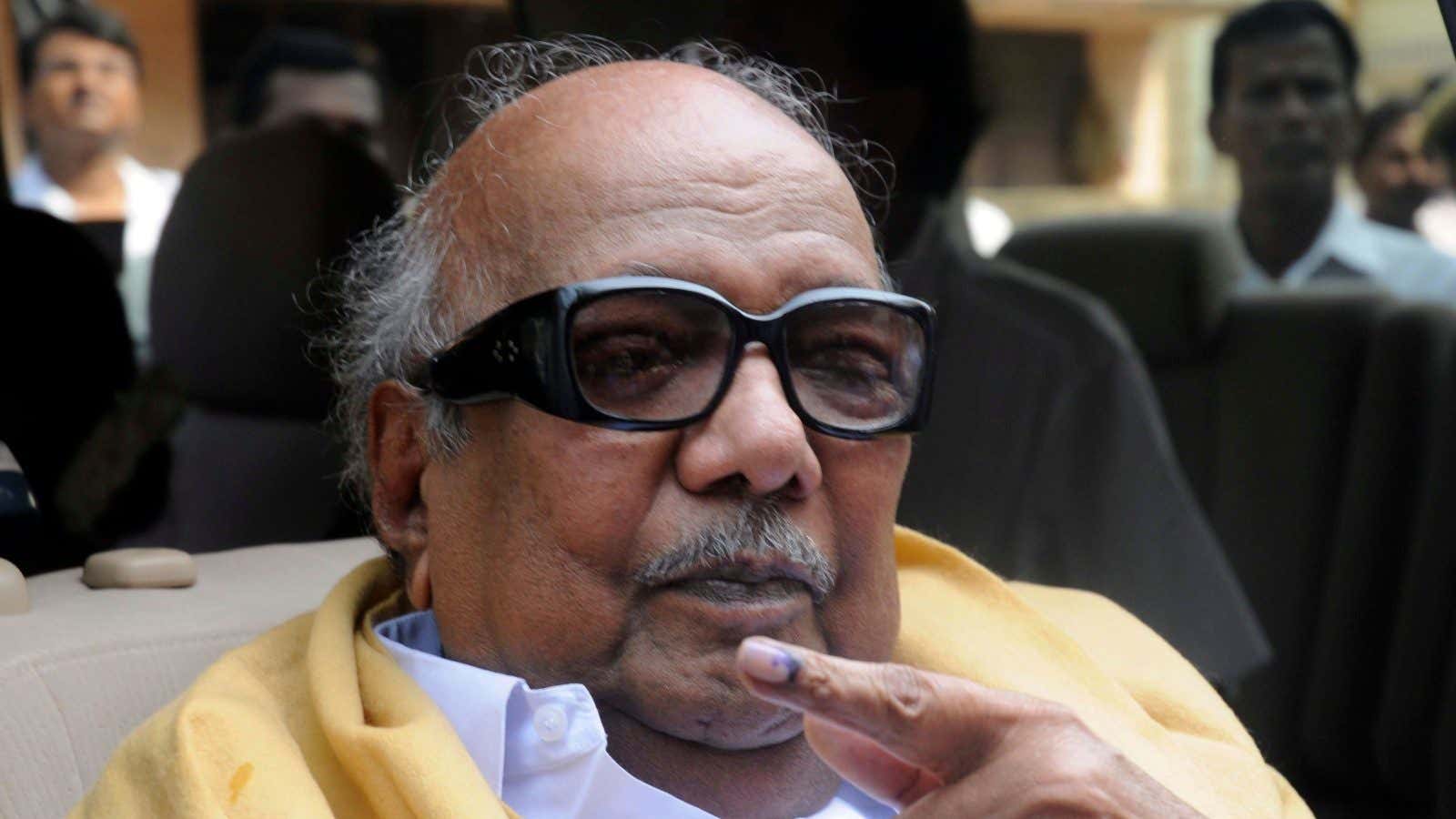Muthuvel Karunanidhi, one of India’s seniormost politicians and a veteran flagbearer of Tamil nationalism, passed away today (Aug. 07). He was 94.
His death was announced by officials of Chennai’s Kauvery Hospital, where had been admitted for the past many days.
Karunanidhi, popularly referred to as Kalaigner, or the artist, was a five-time chief minister of the southern Indian state of Tamil Nadu, first between February 1969 and January 1971, and most recently between May 2006 and May 2011.
He strode into the world of Tamil politics as a colossus for several decades, first in the shadows of popular leaders of the era, as a litterateur, and movie artist, and then as head of the Dravida Munnetra Kazhakam party and chief minister.
During these decades, the state of Tamil Nadu itself witnessed multiple phases of nationalism, separatism, social upheavals, and subsequently moderation—and Karunanidhi was often a driving force of these varied impulses.
Poet-turned-politician
Born in 1924 in Thirukkuvalai village in Nagapattinam district of southern Tamil Nadu, Karunanidhi dropped out of school after class 10 to enter the Tamil film industry.
He began his career as a screenwriter and poet in Tamil cinema even as turbulence intensified in the region in the form of anti-Hindi and anti-Brahminism agitations. That Tamil political milieu fell under the rubric of the Dravidian movement and was headed by the iconic Erode Venkatappa Ramaswamy Naicker, or simply Periyar.
Karunanidhi joined the student wing of Periyar’s Dravidar Kazhakam party and began writing on ideas propagated by the group, which largely espoused self-respect and equal rights for the backward castes and the Dravidian race in general.
Over time, he gained popularity both as a poet and a social rebel, sinking his feet deeper into politics. In 1942, he launched a community newspaper which evolved into Murasoli, the official newspaper of the Dravida Munnetra Kazhakam (DMK) party formed by his mentor Conjeevaram Natarajan Annadurai in 1949 after splitting from patriarch Periyar.
It was Annadurai’s strong influence that propelled Karunanidhi, also encouraging him to use films as a vehicle to connect with the masses.
In 1957, Karunanidhi won his first Tamil Nadu assembly seat as a DMK member.
The ideology
Karunanidhi, like his mentor Annadurai, essentially fought against the caste supremacy of the Brahmins, who, in the Dravidian worldview, were originally from northern India and had for millennia suppressed the lower castes. The movement sought to improve the socio-political and economic status of these backward castes.
An avowed atheist, Karunanidhi was given to mocking Hindu rituals and gods, once even reportedly calling lord Ram a drunkard.
The Dravidian movement visualised the idea of an Eelam—a pristine homeland for the Dravidian race—which included most of southern India and Sri Lanka. So strong was the resonance of the ideology at one point that it even spawned support for the Liberation Tigers of Tamil Eelam, a terrorist group that plunged Sri Lanka into decades of civil war.
Famous rivalries
Among the things that stood out about Karunanidhi’s political journey are his long-standing rivalries.
A number of top Tamil politicians had their grounding in Periyar’s original Dravidian Kazhakam movement. Besides Karunanidhi and Annadurai, this included the matinee idol and former chief minister Marudur Gopalan Ramachandran, popularly known by his initials MGR.
The hugely popular movie actor was once a close friend and comrade of Karunanidhi’s. However, as their professional and political stars ascended, ideological differences cropped up.
In the 1970s, the DMK split further, as MGR broke away to form the All India Anna Dravida Munnetra Kazhagam (AIADMK). This party currently holds power in Tamil Nadu.
The Karunanidhi-MGR rivalry festered for years. So much so that, following MGR’s passing in 1987, his protege Jayalalithaa Jayaraman, another cinema veteran, took the mantle. The actress later herself became the state’s chief minister multiple times and was in office when she died in December 2016.
Tamil Nadu under Karunanidhi
Under Karunanidhi’s chief ministership, Tamil Nadu witnessed multiple economic, social, and welfare programmes. In 1969, his government was the first to set up a commission for backward classes. It also introduced the concept of free education for people belonging to certain castes and classes. Government jobs were reserved for women and several self-help groups set up for their progress.
His party, along with its rivals, has no doubt had a significant role in making Tamil Nadu one of the most progressive and industrialised states of India.
However, his governments were also embroiled in multiple corruption scams. The biggest of them was perhaps the $4.7 billion telecom racket that roiled the Congress-led United Progressive Alliance (UPA) government that was voted out in 2014. The scam played a key role in ruining the chances of the UPA in the national elections held that year.
Nevertheless, Karunanidhi’s mere presence in the Tamil political scene had a stabilising effect on the state.
His signature white shirt and veshti (traditional Tamil formal wear), oversized dark glasses, and bright yellow shawl were unmissable. In recent years, however, he had become largely immobile and was bound to a wheelchair, although he still made public appearances often.
Karunanidhi is survived by his wives Rajathi Ammal and Dayalu Ammal, daughters Kanimozhi and MK Selvi, sons MK Stalin, MK Alagiri, MK Tamilarasu, and MK Muthu.
While his legacy is likely to be inherited by his sons Alagiri and Stalin—the latter already being the DMK’s functional head—and daughter Kanimozhi, his reassuring presence will be sorely missed by his followers.
And coming less than two years after Jayalalithaa’s own passing, Karunanidhi’s departure leaves a huge vacuum in Tamil Nadu’s political psyche for the first time in modern history.
